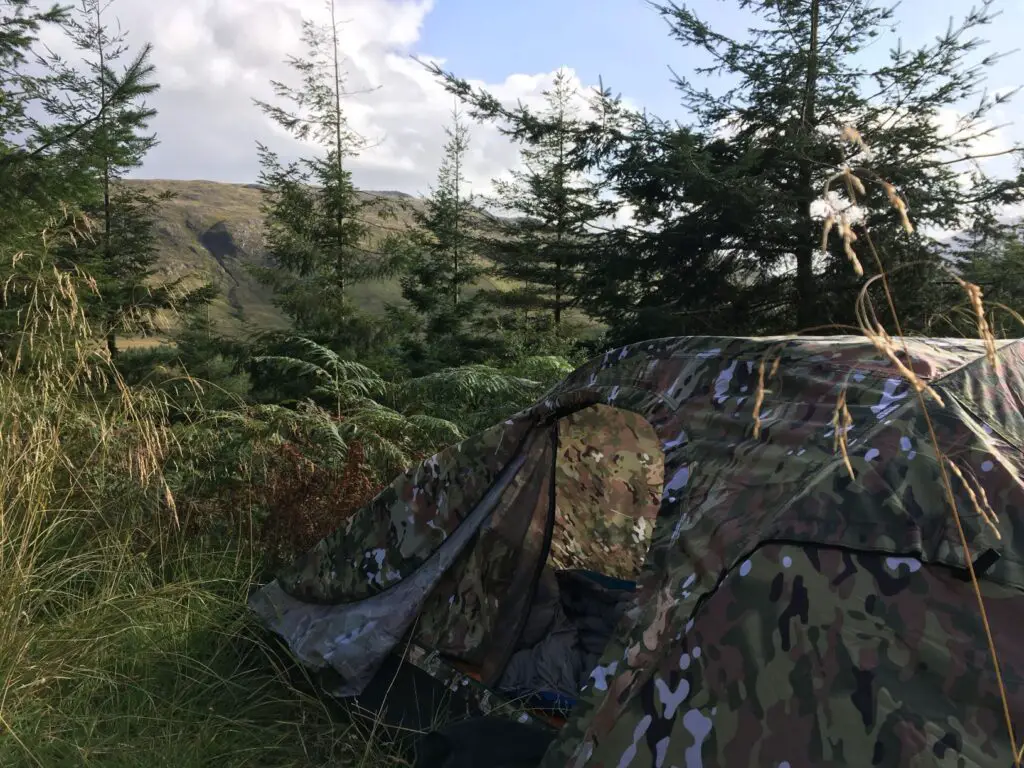Wild camping in England and Wales – Laws and Advice
I recently came across a campaign on Twitter, trying to promote ‘legal wild camping’ by facilitating arrangements with landowners where you book and pay to camp on their land in a designated location. Now, some might say that if you book and pay to camp on a landowner’s land in a designated location then that’s called… a campsite. But let’s not get into semantics.
Instead, I’ll just say that this is an idea that I think needs considerable work.
In the meantime, however, here is a bit of information about wild camping in England and Wales (hereafter referenced as E&W because I’m lazy).
I’m deliberately not including Scotland because they have totally different, and much much better, rules up there.

Massive disclaimer
I’m not a lawyer. None of this constitutes legal advice. You undertake any activity at your own risk, and by reading this blog you absolve the author of any and all legal liability resulting from any camping you may do.
Is wild camping legal?
Yes and no. I mean, mostly ‘no’, but (at this risk of sounding like a politician) it actually depends a bit on your definition of ‘illegal’.
You see, a lot of people would define illegal as something that could land you in trouble with the police, in danger of a criminal conviction, and so on. And with wild camping, if done properly, it can’t land you in that kind of trouble even if you’re ‘caught’ (and there’s no reason you should be, tbh).
Why is this? Well, the problem with wild camping in E&W is that all land here is owned by someone, and there is no general right to put a tent up (especially one of these two-man tents…) and sleep on anyone else’s land. Thus, by doing so, you are committing trespass.
However, in law, there are two types of trespass: civil and criminal. If you commit criminal trespass, the police can remove you, but as long as you leave and have not committed any damage, there is no offence. And it seems very unlikely any wild camper who found himself unwelcome to the point the police were called would do anything other than apologise and leave at once, so the chance of you even dealing with the police are pretty slim.
It gets better though because trespass is only even criminal to begin with under very limited circumstances involving damage to the land, abuse to the landowner or his agents, or bringing six or more vehicles onto the land. It seems highly unlikely that any wild camper would ever activate those criteria, so they remain well within the realms of civil trespass. This blog is not the right place to go into all the ramifications of that, but it means that any action taken by the landowner is a civil matter, with only civil penalties (I.e financial damages) available. And in practice, even if you were unfortunate enough to encounter the vanishingly rare landowner who really wanted to pursue a civil case, if you have not caused them any loss, damages are likely to be insignificant.
Of course, that’s not to say being taken to court mightn’t be bothersome and expensive, but the key thing is that it couldn’t result in a criminal conviction, a ‘fine’ (different to civil damages) or jail. That’s why I say ‘yes and no’ to whether trespass is illegal. So long as you don’t cause damage, don’t break anything, and stay out of residential buildings (obviously) wild camping is illegal in the way a breach of contract is illegal, not in the way assault or theft is illegal.
And in practice?
In practice, it rarely comes to this anyway. Responsible wild campers know to pick spots well away from farms and residences, avoid crops and livestock, arrive late in the evening, and leave early in the morning. They take all of their rubbish with them, leaving no trace of their presence. Under those circumstances, it’s a rare landowner indeed who will even know they are there, let alone object, and (if they do object) let alone do any more than ask them to leave.
What is the punishment for wild camping in the UK?
The maximum punishment, or penalty, handed down for a successful wild camping prosecution is a £2,500 fine or 3 months prison sentence, or both. In most cases, landowners have been known to demand campers leave their land immediately rather than call the police, or seek a conviction.




